
menu

Posted in Uncategorized | November 29, 2021
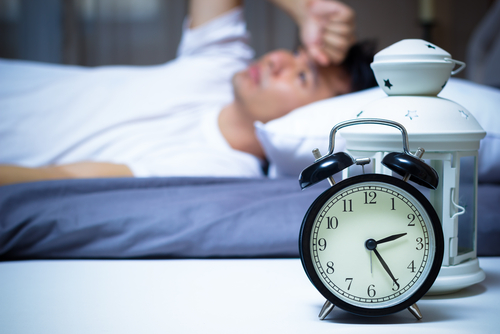
Have you or someone you love recently been diagnosed with obstructive sleep apnea (OSA)? You’re not alone, as approximately one out of every five Americans have some degree of OSA.
OSA is a serious health condition that occurs when your breathing slows down or repeatedly stops due to collapsed tissue in your airways. Tissue collapsing in your airways can recur hundreds of times in one night as you sleep, blocking your oxygen intake each time.
When left untreated, obstructive sleep apnea leads to a myriad of problems like daytime fatigue, depression, a considerable loss of productivity, along with the increased risk of accidents and injury.
Additionally, obstructive sleep apnea makes you more prone to heart disease, high blood pressure, stroke, coronary artery disease, and heart failure.
For these reasons, it’s crucial to diagnose and treat OSA accurately. Keep reading to learn why a home sleep study may help you sleep better!
Previously, ENT specialists diagnosed OSA and other sleep disorders by having patients complete an overnight sleep study performed in a lab. But this option is expensive and can often be an inconvenience to patients.
Now, sleep specialists have a better alternative when it comes to conducting sleep studies. Rather than having patients take sleep studies conducted at a lab, they can take an at-home sleep study to diagnose sleep disorders.

Your doctor may suggest an in-home sleep study if your partner constantly complains about your snoring. You may also require a home sleep study if you have persistent fatigue or daytime sleepiness.
The adverse effects that OSA and a lack of sleep can have on your health make it essential to get an accurate diagnosis and timely treatment. An at-home sleep study can be a part of your preventative care plan in addition to your diagnosis.
Some of the many benefits a home sleep test has over completing an in-lab sleep study include:
Although taking an overnight sleep study at a lab can diagnose OSA correctly, staying in a lab overnight can be uncomfortable. It can also be inconvenient to try and schedule a time to fit it into your schedule.
If you have a hard time sleeping in your bed, imagine how much more difficult it will be trying to fall asleep in a lab with monitors and wires attached to you. When you take a home sleep study, you’ll get to sleep in your bed at home with a lot less equipment attached to you.
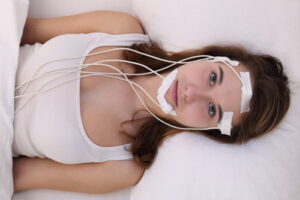
The data collected in a sleep study is essential. The information from the sleep study allows your ENT doctor to evaluate your condition, determine its severity, and provide the proper treatment customized to your individual needs.
For this reason, the quality of sleep recorded during the study must be as close to your usual sleep quality as possible. However, this might not be possible when you’re taking an in-lab sleep study.
You may find it challenging to sleep in an unfamiliar environment, which may interfere with your ability to sleep ordinarily and the results your ENT specialist can collect. Unfortunately, poor sleep data can result in a misdiagnosis, and the wrong treatment, which can be costly for your health.
Without a sleep study, you can’t have your sleep apnea appropriately diagnosed. Not getting your sleep apnea diagnosed can lead to a host of health problems.
Taking a home sleep study will provide your ENT specialist with more accurate sleep quality data, a necessary component for a proper diagnosis, and the best treatment plan.
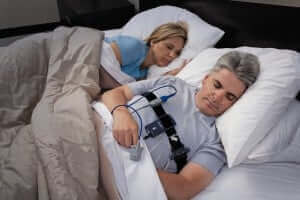
Unlike an in-lab sleep test, a home sleep study needs less equipment and doesn’t require a sleep technician or commuting to and from the lab. Taking a home sleep test is a lot more affordable than traveling to a sleep study taken at a lab.
Both non-surgical and surgical options are used to manage OSA. Medical or non-surgical options include oral appliances, weight loss, and CPAP (Continuous Positive Airway Pressure). It’s important to note that the effectiveness of OSA treatments will depend on your consistency and long-term adherence. Some of the treatments used are:
Nasal obstruction not only contributes to snoring but also worsens OSA. It also makes treatments like oral appliances and CPAP ineffective.
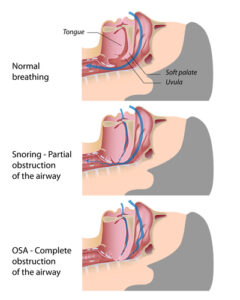
Nasal obstruction can be due to various reasons like enlarged adenoids, allergies, a deviated septum, or polyps. Treatments often begin with allergy management and nasal sprays. For structural problems, the best option is usually surgical treatment.
Some OSA patients experience an airway collapse in the lower throat area. The upper part of the voice box may collapse, causing airway obstruction.
Additionally, the tongue can collapse as you sleep due to a lack of muscle tone. The tongue collapsing is common if you sleep on your back.
In some instances, the base of the tongue might be too large, particularly for patients that are obese. Different procedures are used to advance the tongue forward or reduce the size of the tongue base.
Other surgical treatments are available to stabilize the hyoid bone and the epiglottis like a hypoglossal nerve stimulator that stimulates the tongue’s forward contraction while asleep.
Many patients with OSA will experience narrowing of the airway and collapse in the soft palate, uvula, and tonsils. Surgery is used to widen the throat by removing tissue as well as repositioning throat and palate muscles.
An adenoidectomy or tonsillectomy can treat sleep apnea symptoms in adults and children with enlarged adenoids or tonsils.
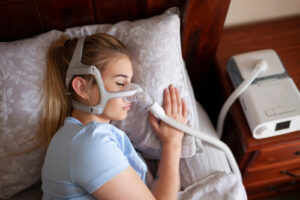
Sleep is critical to your mental, physical, and emotional wellbeing. Without quality sleep each night, you might need a home sleep study to uncover the root cause of the problem.
The expert ENT specialists at Specialty Care ENT offer the convenience of home sleep studies to gain an in-depth understanding of your sleeping habits. We can accurately diagnose your condition and provide a highly individualized, top-of-the-line treatment plan with this understanding.
Are you not getting a good night’s sleep? Schedule an appointment at Specialty Care ENT in Barrington, IL, to learn more about home sleep studies!